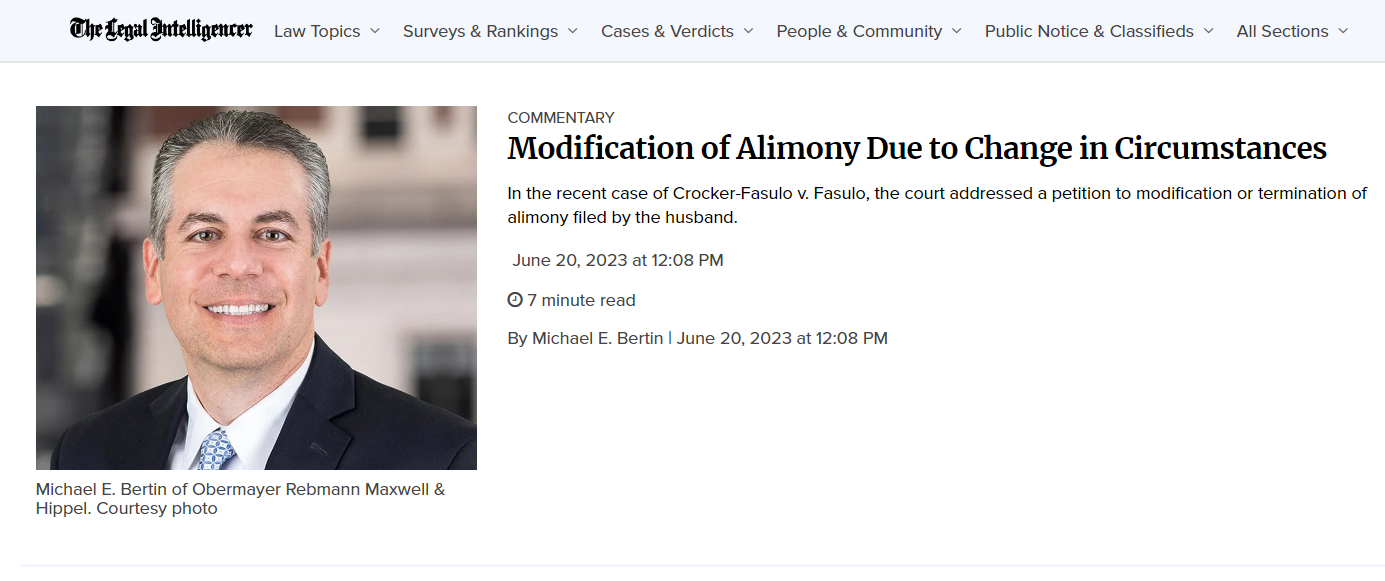The Legal Intelligencer: Modification of Alimony Due to Change in Circumstances
In an article published in The Legal Intelligencer on June 20, 2023, partner and co-chair of the family law group, Michael Bertin, discusses alimony orders. In the article, titled “Modification of Alimony Due to Change in Circumstances,” Michael analyzed the recent Pennsylvania Superior Court case of Crocker-Fasulo v. Fasulo, 292 A.3d 591 (Pa. Super. 2023), which addressed a petition to modification or termination of alimony filed by the husband.
When a trial court enters an order for alimony, in conjunction with the entry of a divorce decree, under Pennsylvania’s Divorce Code, the alimony order is subject to being modified, suspended, terminated, or reinstated upon changed circumstances of either party of a substantial and continuing nature. Such an order, modifying, terminating or suspending an alimony order under the Divorce Code, “shall apply only to payments accruing subsequent to the petition for the requested relief.”
The pertinent facts of the Fasulo case are as follows: at the time when the parties married in 1982, the husband was in medical school. After the parties married, the husband continued his medical training and the wife continued to work until the birth of the parties’ first child in 1987. The parties separated in 1998 and the wife filed for divorce approximately 11 years thereafter in 2009. Following a hearing, in 2010, the court entered a final divorce decree in 2012, which ordered permanent alimony to the wife in the amount of $8,500 per month. After the entry of the divorce decree, the husband began to experience symptoms of Parkinson’s Disease.
According to the trial court opinion, “following his diagnosis, [the husband and wife agreed to multiple modifications to the alimony payment and on Jan. 1, 2020, the husband was paying $3,750 per month in alimony.]” The husband, thereafter, filed a petition for modification or termination of alimony in August 2021. After a hearing, the trial court entered an order reducing the husband’s alimony award to $2,500 per month. The husband appealed, raising several issues, one of which was whether the trial court abused its discretion and committed an error of law in ordering the husband to continue to provide a $1 million insurance policy payable to the wife as a beneficiary. The Superior Court found that the trial court did not err in entering its order.
This case is important for the family law practitioner, as it provides a reminder that alimony orders entered by a trial court are modifiable upon a substantial change in circumstances that are continuing in nature. Further, it reiterates that the 17-factor analysis for alimony is to be applied by the trial court upon a petition to modify alimony. The issue raised by the husband as to whether the trial court indirectly created a distribution of nonmarital assets by looking at his post-divorce assets for purposes of alimony is an interesting issue. However, under the facts of the Fasulo case, the Superior Court found no error. It is important to note that the trial court provided the husband with the ability to further modify the order as circumstances change in the future.
Read the full article here.





